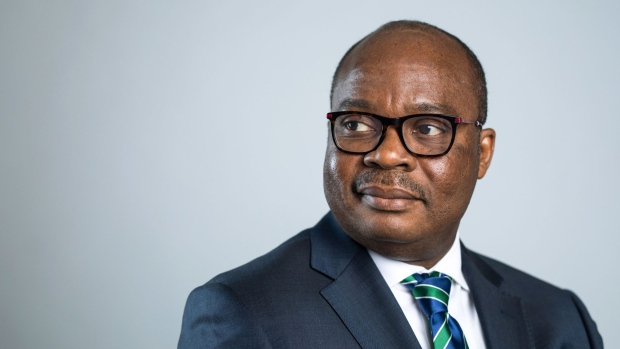Nov 28, 2022
Ghana Currency Funk, Inflation Jump to Spur Rate Hike: Day Guide
, Bloomberg News

(Bloomberg) -- Ghana’s central bank increased its benchmark interest rate to the highest level in more than 19 years to cool persistent inflation. The cedi advanced.
The monetary policy committee raised the official cost of borrowing by 250 basis points to 27%, Governor Ernest Addison told reporters Monday in the capital, Accra. The median estimate of eight economists in a Bloomberg survey was for an increase of 175 basis points.
The MPC acted as “significant upside risks to the inflation outlook remain,” Addison said.
The cedi gained 0.9% against the dollar to 14.3750 by 2:39 p.m. in Accra, the most since Oct. 31.
The latest move adds to cumulative rate increases of 11 percentage points since November that have aimed to temper runaway inflation. Price growth is now quadruple the top of the central bank’s target band of 6% to 10%, prompting the central bank to bring the real policy rate closer to positive territory to attract investment.
The nation’s debt is rated junk and it’s now asking bondholders to accept losses on their investment.
Read more: Ghana Needs Bondholders More Than Ever as Debt Crisis Deepens
Inflation has been fanned by surging commodity prices stemming from Russia’s war with Ukraine and the West African nation’s plunging currency.
The cedi, the world’s worst-performing currency this year, has weakened by more than 27% since the MPC raised borrowing costs by 250 basis points on Oct. 6. The depreciation placed pressure on the nation to meet its import bill, which exceeds $10 billion a year, Finance Minister Ken Ofori-Atta said in his annual budget presentation Thursday. It’s also made debt repayments more expensive.
Inflation is forecast to peak in the first quarter of 2023 and settle around 25% by end of next year, the governor said. “The forecast is conditioned on the continued maintenance of a tight monetary policy stance and the deployment of tools to contain excess liquidity in the economy,” he said.
Risks to the outlook include a proposed increase in the value-added-tax rate by 2.5 percentage points, announced by Ofori-Atta Thursday, and exchange rate pressures, Addison said.
Inflation Measures
The hike adds to measures taken by the Bank of Ghana earlier this month to prevent a slide in the cedi and contain inflation. That includes the decision to no longer provide foreign exchange for imports of rice, bottled water, poultry, fruit juice and other “non-critical goods,” according to a circular sent to lenders.
Bottled water prices rose 64% in October and fruit and vegetable juices 54% from a year earlier.
The government has also taken its own steps to help. It’s ordered large gold-mining companies from Jan. 1 to sell a fifth of the metal they refine to the nation’s central bank, as Ghana embarks on a plan to barter bullion for fuel.
The decision is likely to place further strain on consumers and businesses. The S&P Global Ghana Purchasing Managers’ Index has been below 50 since February, indicating a deterioration in business conditions.
Increasing economic hardship has fueled protests and led to calls for the finance minister to resign. It’s also prompted the nation to seek a $3 billion economic program from the International Monetary Fund.
Goldman Sachs Group Inc. economists, who correctly forecast the increase, said they expect Ghana could reach an agreement with the IMF staff in the next month or two. “If this takes place, we think it would provide some anchor for the cedi as well as for monetary policy and inflation,” they said.
--With assistance from Paul Richardson, Arijit Ghosh, Prinesha Naidoo, Neil Munshi and Simbarashe Gumbo.
(Updates with currency move in paragraph four and inflation forecasts in paragraph nine)
©2022 Bloomberg L.P.






